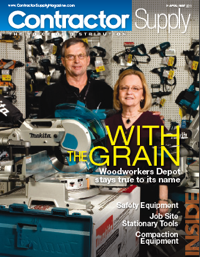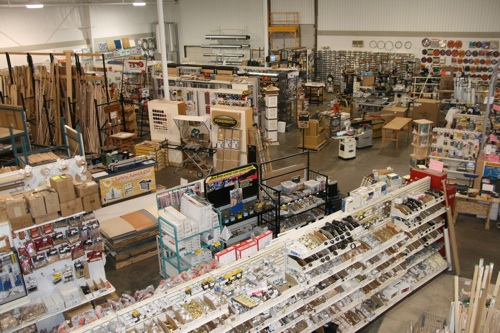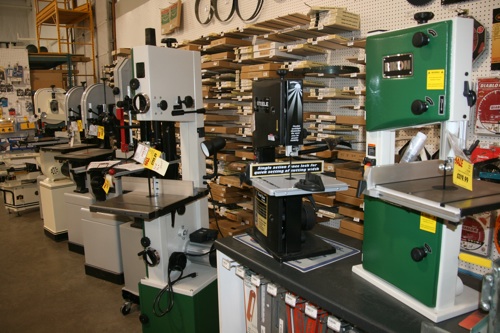Woodworkers Depot Goes With the Grain
Through thick and thin, Woodworkers Depot of Green Bay has elected to stay true to its core customer base, professional woodworkers.
 |
| To weather the recession, Merl (L) and Char Stingle slashed costs and inventory in their Green Bay, WI store, but not their focus on their core woodworking customers. |
By Tom Hammel, Contractor Supply Magazine
Business during the last couple of years has been veneer-thin for many distributors, but especially for residential construction specialists and their counterparts who served supporting trades such as the woodworking market. As home construction dried up, so did the livelihoods of thousands of small custom carpentry shops and cabinet makers.
The woodworking hobby also dropped off as consumers found themselves without the discretionary dollars to funnel into tools and accessories. Only in the last year have retailers seen new shoots of buying life coming back into the market.
WoodWorkers Depot of Green Bay, Wis. bills itself as one of the Midwest’s largest woodworking stores, and we are hard pressed to disagree. Launched in 1993 by Merl and Char Stingle to serve Wisconsin cabinet shops and furniture makers, the company soon outgrew its first location. They bought a 34,000 square-foot facility and began filling it with the stuff of woodworking dreams from Festool, Bosch and Makita tools, to production behemoths from Delta/Porter-Cable, General, JET, Rikon, Powermatic, Steel City and Woodstock International/Shop Fox.
Today, most of the large industrial display machines are gone, but the core products remain; power tools and equipment; table, miter, scroll and band saws, turning lathes and blanks, router bits and tables, mortising machines, blades, abrasives and air compressors. A few larger items like a large Powermatic planer and an “entry-level” General CNC machine sit among a range of table saws.
 Other woodshop staples such as clamps, outfeed rollers stands and dust collection systems are also plentiful. A sizeable area of the store is devoted to dust collection systems, from small single bag set-ups, “spiral duct” parts and filters to a two-story-tall DISA whole-shop system.
Other woodshop staples such as clamps, outfeed rollers stands and dust collection systems are also plentiful. A sizeable area of the store is devoted to dust collection systems, from small single bag set-ups, “spiral duct” parts and filters to a two-story-tall DISA whole-shop system.
“We’re very strong in dust collection,” says Merl Stingle, president of WoodWorkers Depot. “I’m a mechanical engineer by trade, so we carry both the usual products and more specialized fittings to help our customers comply with EPA regulations and design the most effective systems for their needs. Most companies like ours sell 30-micron dust bags, but we only sell 1 & 2-micron systems here; I don’t think we’ve sold a 30-micron bag here in years. Our vendors thought we were crazy but we know it is the right thing to do.”
| Woodworkers Depot at a Glance |
| Founded: 1993 Ownership: C Corporation Headquarters: Green Bay, WI Facility: 34,000 square feet (15,000 are rented out) Staff: Eight Market: Professional woodworkers, remodelers and hobbyists Services: Sales, set-up, tool repair, sharpening Territory: Wisconsin, upper Michigan; ships nationwide Model: Inside sales based with some customer visits Line card: Makita, Bosch, Porter-Cable, General Tools, CNC, JET, Powermatic, Rikon, Steel City, Steele, Woodstock Int’l/Shopfox, Invicta, Safety Speed, Tormek, Flexcut, Festool, Fein, Irwin, Mirka Abrasives, CMT, Freud, Easy Power, Rolair, Jorgensen, Rockwell, Whiteside, Freeborn, Stanley, Kreg, Grex, Grip-Tite, Bessey, Bora, Titebond, Gorilla Glue, Samona, Stabila Affiliations: STAFDA, since 2002 Web site: www.woodworkersdepot.com |
A STATIONARY MARKET
Traditionally, the store’s largest product category, in both inventory dollars and sheer tonnage, has been stationary tools. Ironically, this was also the first category to fall victim to the recession.
“Our most important brands have been the stationary tools,” Merl says. “But from the middle of 2008 through the third quarter of 2009 that category took a big nosedive. Worse, the larger $10,000 machines started slowing down long before that, so we knew a downturn was coming. We had a lot of inventory tied up in stationary equipment, which made it really difficult for us for a while.”
Rather than sell off the big iron for pennies on the dollar, the Stingles decided to sell them down slowly and focus on other ways to keep cash flowing. They refocused all available inventory funds on high-turn consumables like sandpaper, blades and bits.
“We have our own house brand of abrasives that has been extremely successful for us. We have a wide range and they are well-priced,” Merl adds. “We also sell a lot of Mirka abrasives, and we have by far the largest selection of router bits and band saw blades in the area.”
Stingle says they could have taken the company in different directions, such as commercial construction.
“We were in the concrete market to an extent, but it wasn’t our main strength. So although it may not have been the best decision for the time, we decided to focus on our pure woodworking customer, which was probably the worst sector of the market at that point. But we said, ‘This is where we are, this is where we are going and we are going to get better.’
“That period was really difficult because we always had everything the customers wanted but suddenly were limited in what we could offer. We couldn’t stock everything we wanted, and for a time even our consumables buying power was hurt.”
NEW HABITAT
The Stingle’s 34,000 square-foot building became more than they needed. In a stroke of luck, they found Habitat for Humanity, which rented almost half of the building
for a “Restore” donated building products store in 2009.
 During the recession many cabinet makers and carpenters turned to remodeling work to pay the bills. The Stingles now share some customers with the Habitat Restore, but at least those contractors are still working — and Habitat for Humanity pays rent. “It has been a perfect fit,” Merl says. “Habitat’s customers need our products and our customers need theirs. They bring us a lot of traffic.”
During the recession many cabinet makers and carpenters turned to remodeling work to pay the bills. The Stingles now share some customers with the Habitat Restore, but at least those contractors are still working — and Habitat for Humanity pays rent. “It has been a perfect fit,” Merl says. “Habitat’s customers need our products and our customers need theirs. They bring us a lot of traffic.”
NOTHING’S SACRED
In the scramble to cut costs to keep the doors open and critical products in stock, the Stingles embarked on their own “lean” crusade, reviewing every line item from vendors, terms and inventory, to customer credit, marketing, health care and advertising.
“Before the recession we advertised in newspapers, radio and TV — even during Packer games and shows, but right now we are living off what we have done more than what we’re doing,” Merl says. “Cutting advertising hurt our sales but we didn’t think we could get our money back during that time, so we decided not to advertise until we saw a significant change for the better in the market.”
Travel was eliminated and purchasing was slashed from supplies to services. The company even cancelled its garbage service and now recycles most of its waste.
“We totally changed our cost of operation,” he says. “I don’t think there was a single cost that actually went up; we worked them all down. We are much ‘lighter on our feet’ and cost effective today.”
 |
| “We prioritized our lines to favor the vendors who gave us the best support.” — Merl Stingle |
ADD AND SUBTRACT: THE LINE CARD
Stingle makes a special point to commend his vendors for their help during the downturn. Equipment manufacturers faced their own hardships during the recession and how they met those challenges changed their offerings and terms, too. WoodWorkers Depot felt their pain in several ways: Some companies eliminated accessory lines; others slashed production and tried to “hibernate.”
“I was amazed by the understanding and loyalty of most of our vendors and customers,” Stingle says. “Our vendors had special buy-ins and gave us extended dating, and you have to remember they were hurting through that time, too. We prioritized our lines to favor the vendors who gave us the best support. We did that with every line. We focused on the vendors who were willing to work with us, and their sales grew.”
As some lines went away, others moved in to fill the gaps. “We added Steel City, and Rikon to our stationary tool lines, and Steele and Rolair to our air compressors,” Merl says.
Today the store still carries pretty much every router and shaper bit commonly used on the planet, and enough hardwood and exotic lumbers, veneers and turning blanks to keep customers envisioning that next project. Aisles of CMT, Freud and Freeborn bits wait in locked display cases. The store also provides tool repair and sharpening.
“We are an authorized repair center for almost every brand we sell, including Fein,” Merl adds. “We also do some service work for our area big boxes, so we work on Ryobi and Ridgid tools too. Repair is not a profit center for us per se, but it certainly helps drive sales. Service people are about the best sales people there are because they can look at where a tool is in its lifespan and recommend either fixing it or upsell the customer a new one.”
Presently, Woodworkers Depot has one full-time service technician. Other employees, including Merl, pitch in to help with repairs when needed. They also make “house calls” for large stationary equipment too heavy to move.
ALL SHAPES AND SIZES
As a counter to its “hard-core” woodworking supplier image, an area of the store is devoted to wood-based crafting books, DVDs, craft sets, supplies and walls of patterns for projects from yard-art to toys, bunk beds and Adirondack lawn furniture. Char Stingle, Merl’s wife and company vice president, manages the inventory and merchandising of this part of the store.
This side of the store has a decidedly female flavor. As a result, Woodworkers Depot has a higher than normal percentage of female customers, who typically skip the big tools and make a bee-line for the craft section in the front left of the store. This gives them a broader customer demographic in all departments of the store.
 |
| “Customers really think things through now before they buy, you can tell, but business is improving.” — Char Stingle |
COMPANY HEALTH
Char also administers accounting, human resources, the computer system and company health care.
“When you stay with one provider for years, you get comfortable with them and tend to just accept rate increases,” Char says. “We looked at other companies and recently changed to a health reimbursement account insurance plan, which is proving to be a big savings.
“We always paid a percentage of employee premiums, and we still do, so we set that as a new base and let them do what they want. The employees pay their own premiums and we reimburse them every month for the base we have set. They are coming up with good policies and they end up paying nothing out of pocket, or very little. It’s working very well.”
Char is glad the recent tough five quarters are behind them.
Business is improving,” she says. “People aren’t exactly free with their money yet, but they are a little less tight with it. For quite a while there they were just fixing what they had, but they are beginning to buy and replace equipment again. Customers really think things through now before they buy, you can tell, but business is improving. It just has to keep improving,” she concludes and laughs. CS


















